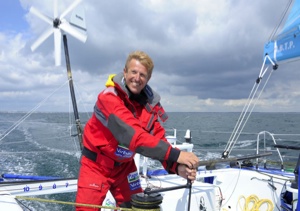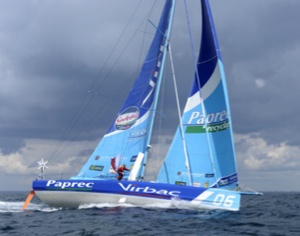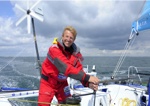At 43 years old, Jean-Pierre Dick is an experienced sailor. In 2002, he heeded the call of the sea and embarked on numerous trials that would earn him fame on Virbac-Paprec and then on Paprec-Virbac 2. He has participated in all the legendary races, whether it be the Solitaire du Figaro, the Transat Jacques Vabre, or the Vendée Globe. This is the sailor’s second participation in this fabulous competition. He will want to do better than his previous third and sixth-place finishes. We will know the outcome in about ten weeks.
 The Vendée Globe is the most demanding offshore race for the body. Nearly 90 days at sea, alone with only radio, satellite phone, or a small webcam for communication.
The Vendée Globe is the most demanding offshore race for the body. Nearly 90 days at sea, alone with only radio, satellite phone, or a small webcam for communication.
You have to endure physically and mentally, especially when aiming for the top spots. It’s not always an easy situation to live with, but with a bit of organization, it’s manageable. Jean-Pierre Dick has his way of managing sleep: “If everything goes well, I try to sleep three times for 1 hour and 15 minutes a day, twice at night. Our bodies are accustomed to sleeping at night, which is why we rest more during that time. To this sleep, I try to add three short restorative naps a day of 10 to 20 minutes each. This is the rhythm when everything is going well.”
The problem is that reality often differs. You have to be able to manage your fatigue to remain as clear-headed as possible. Especially since Jean-Pierre Dick is currently third in this Vendée Globe. Accompanied by about fifteen competitors, he finds himself upside down as he crossed the equator on the night from Friday 21 to Saturday 22. He explains: “I crossed the equator at midnight on the dot last night. I didn’t see Neptune because I was sleeping like a baby in the arms of Morpheus. I crossed into the Southern Hemisphere without even realizing it! Onboard, it’s a bit rough and wet. I use sliders (sliding panel) to protect the cockpit well. Even though the water is warm, there’s no point in getting wet unnecessarily. It’s a great innovation from the Paprec-Virbac design team!”
An innovation that allows him to protect his boat and continue his journey a week after passing through the doldrums, an area with very calm winds. That’s when skippers need to be most vigilant, reminds the Nice-born sailor: “If the wind constantly changes direction or strength, it requires full attention to adjusting the boat, so I sleep in small chunks of 10 to 20 minutes.
This allows me to push the 1h15 sessions to another period. I try to keep at least one piece during the day. Sometimes I also sleep with flash naps of 1 to 2 minutes. As soon as the situation allows, I return to the rhythm of three 1h15 sessions a day plus 2 to 3 naps of 15 minutes. When the wind is weak, I sleep very little because I’m on deck to capture every slightest breeze and escape the calm zone, not to be left behind by the other competitors.”
 Now in the Southern Hemisphere, he can organize the boat a bit after a period of turbulence at the start of the race: “At the beginning of the race, we faced a big storm, and I only slept in 20-minute intervals. Fortunately, it calmed down, and I was able to catch up on lost sleep. At one point, I was so sleep-deprived that I started having hallucinations! It’s a sign that you need to sleep quickly because you lose a bit of control over yourself and the boat.”
Now in the Southern Hemisphere, he can organize the boat a bit after a period of turbulence at the start of the race: “At the beginning of the race, we faced a big storm, and I only slept in 20-minute intervals. Fortunately, it calmed down, and I was able to catch up on lost sleep. At one point, I was so sleep-deprived that I started having hallucinations! It’s a sign that you need to sleep quickly because you lose a bit of control over yourself and the boat.”
The next obstacle is the island of Saint Helena, known for its anticyclone, comparable to that of the Azores in the Northern Hemisphere, meaning a calm zone. A crucial step in Jean-Pierre Dick’s progression, as he recalled on Monday: “I am sailing on a crosswind (excellent for monohulls, editor’s note), Paprec-Virbac 2 has accelerated, things are getting wet on deck. I am slowly approaching Sébastien Josse (2nd editor’s note) and distancing Vincent Riou (4th editor’s note). This is all positive! The further south we go, the closer we get to the Saint Helena anticyclone. Starting today, I’ll be spending time at the chart table to figure out a strategy. Otherwise, everything is going well. I eat well, I sing, I tinker around.” A happiness that is likely to be short-lived since the anticyclone is quickly approaching for the leaders. They should reach it by Thursday, but the skipper of Paprec-Virbac II is prepared: The wind has shifted (the wind veers away from the boat, editor’s note) earlier for Loïck and Sébastien. They therefore sped up before me. I think I’m catching their wind now, and I’m picking up speed myself! On the west side, Golding is moving very fast. We’ll need to keep a close eye on the English firefighter. Today’s menu: strategy. I’ll be spending time at my chart table to study the weather. Things are evolving rapidly, but the models (weather) aren’t consistent. There’s a big anticyclone in the middle of the route, so caution is necessary. The route we choose is a gamble on the future. Everyone is heading south. There are no options at the moment because the situation isn’t clear. Otherwise, everything is fine on board: I’m well-rested to tackle Saint Helena and taking care of my steed before heading into the South.”
The next itinerary for Jean-Pierre Dick is next Wednesday. He will then embark on the South Atlantic loop and the first set of mandatory gates before the Cape of Good Hope.


